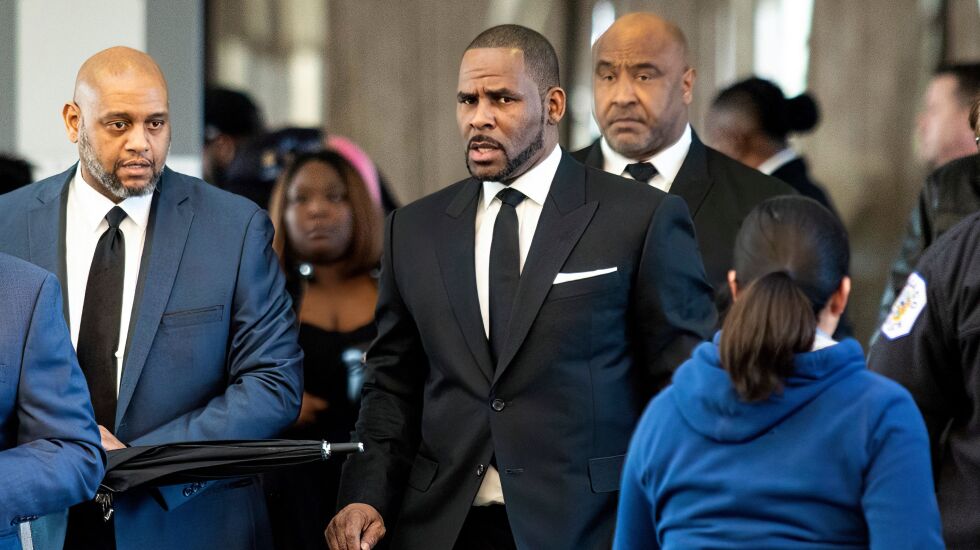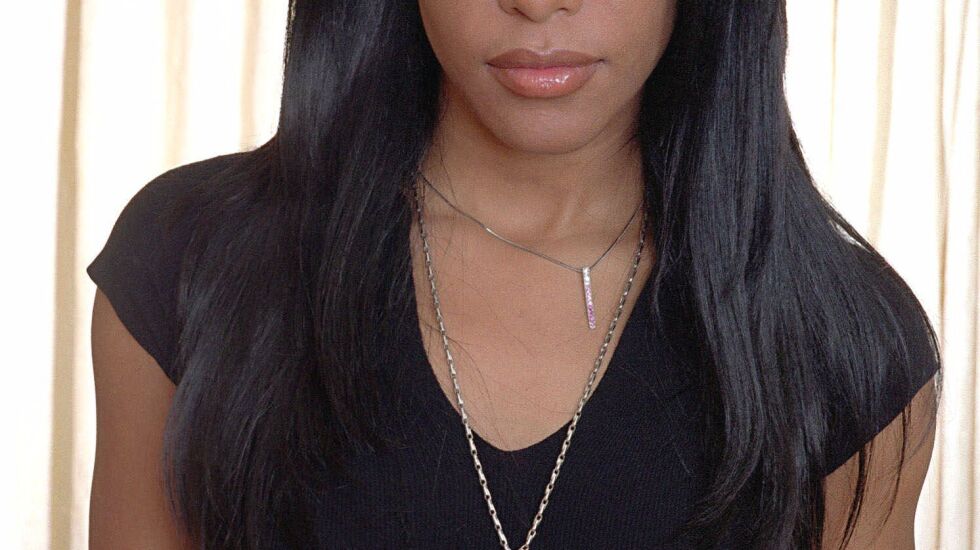
The avalanche of sex-crime charges piled upon R&B superstar R. Kelly three years ago ended the decades he spent dodging serious accusations and criminal prosecution.
The man once heralded as one of his genre’s greatest singer-songwriters is now a convicted sexual predator, serving a prison sentence likely to keep him behind bars until his late 70s.
But the feds aren’t done. Kelly, 55, is set to go on trial all over again Monday, this time in Chicago’s federal courthouse, on the second of two indictments that effectively ended his freedom in July 2019. This time, he faces charges alleging child pornography, obstruction of justice and the enticement of minors into criminal sexual activity.
Jurors over the next four weeks will be transported back in time to Chicago of the late 1990s and early 2000s, to the zenith of Kelly’s career, and to his 2008 trial in state court during which Kelly is now alleged to have pressured, intimidated and bribed his way to an acquittal.
Though it all comes six weeks after a federal judge in New York handed Kelly a 30-year prison sentence, legal experts say this new trial could vindicate other accusers and the failed attempt to hold Kelly accountable 14 years ago. Also, given Kelly’s ongoing appeal in the New York case, it could serve another purpose if it ends in a second guilty verdict.
“This gives you insurance that Mr. Kelly remains in prison regardless of what happens in the first conviction,” Renato Mariotti, a former federal prosecutor, told the Chicago Sun-Times.
Still, any such victory by the feds will be hard-fought. At Kelly’s side this time will be Jennifer Bonjean, the aggressive, never-back-down defense attorney whose legal career soared to new heights when she helped free actor Bill Cosby last year. She has said that the age of Kelly’s alleged victims at certain points in time “are of central importance in this case.”
She also told the Sun-Times that Kelly’s new trial is “total and complete overkill” resulting from a government fixation she believes is “motivated, in part, by race.”
“There are people who have committed heinous acts of murder, rape, pillaging that are not looking at a life sentence,” Bonjean said. “They want [Kelly] to die in prison.”
Bonjean also complained about a separate investigation into a Bureau of Prisons employee accused of leaking information about Kelly to an entertainment blogger, wondering why that worker has not faced criminal charges.
Kelly will be joined at trial by two co-defendants, former employees Derrel McDavid and Milton “June” Brown. McDavid is charged with helping Kelly illegally thwart the 2008 trial, and his attorneys have been aggressively challenging the feds in the last few weeks. They even raised questions about the conduct of a former lead prosecutor whom they have said they want to call as a witness.
One of those attorneys, Beau Brindley, told the Sun-Times that McDavid was “doing what he thought was the best of his job for a client who was not fully truthful with everybody.” Brown’s attorney, Mary Higgins Judge, declined to comment.

The most crucial testimony in the trial will likely come from a woman whose absence from Kelly’s 2008 trial was blamed for his acquittal then. Though she refused to take the stand in 2008, she’s expected to do so now and allege that she and members of her family were intimidated into protecting Kelly during that earlier investigation.
Prosecutors have made clear that her testimony represents just a fraction of the case against the singer. In all, the case involves five alleged victims, four videos, 13 counts and 24 years of alleged conduct starting in 1996.
That’s the same year Kelly released the smash hit “I Believe I Can Fly.” Dating the case even further, jurors will hear how Kelly allegedly recorded sex acts with a camcorder and VHS tapes.
“These are videos that have been circulating around for decades and have been handled by people who have been involved in their own criminal shenanigans,” Bonjean told the Sun-Times.
High-profile individuals revolving around the trial include Michael Avenatti, the disgraced celebrity lawyer who purportedly represented one of the witnesses, and the late Edward Genson, the legendary Chicago defense attorney who represented Kelly during the 2008 trial.
Though prosecutors say the witness list does not include Jim DeRogatis, the former Sun-Times journalist who first helped report allegations against Kelly decades ago, McDavid’s lawyers say “he is part of the chain of custody” of a key video.
Presiding over all of it in the ceremonial courtroom of the Dirksen Federal Courthouse will be U.S. District Judge Harry Leinenweber, an 85-year-old former state lawmaker who has served on the bench since 1986 and once acquitted Brindley when he faced charges of his own.
Leinenweber agreed earlier this month to let the alleged victims testify using only their first names or pseudonyms to protect their identities. He also ruled that jurors’ names will be kept confidential, and the alleged child pornography at issue will not be shown publicly.
Mariotti, the former prosecutor, said he thinks the case in Chicago is the strongest brought against Kelly, which might help explain why prosecutors were less interested in resolving it with some sort of plea deal. He said he expects some “very creative strategies” from defense lawyers, though, making it difficult to predict how the case will play out.
“It’ll make for a very interesting trial,” Mariotti said.
‘Age Ain’t Nothing But a Number’
Born Robert Sylvester Kelly on Jan. 8, 1967, R. Kelly is remembered as a shy child who grew up on Chicago’s South Side. The discovery of his musical talent at Hyde Park’s Kenwood Academy is said to have taken him from collecting hundreds of dollars in spare change while performing on CTA L platforms, to working with Michael Jackson and Celine Dion and performing at the opening ceremony of the 2002 Winter Olympics in Salt Lake City.
In 1994, Kelly produced the debut album for his 15-year-old protege, Aaliyah Haughton, featuring the title track, “Age Ain’t Nothing But a Number.” That year, when he was 27, Kelly married Aaliyah, who has been described as one of the few people Kelly ever truly loved.

Kelly thought he had gotten Aaliyah pregnant, so he had a public worker in Illinois bribed into making a fake ID so they could apply for a marriage license, according to evidence in Kelly’s New York case.
The marriage between Kelly and Aaliyah would later be annulled, and Aaliyah died in a plane crash in 2001. The feds in Chicago have said they should be allowed to ask Kelly about that bribe if he decides to testify here, calling it “an act of dishonesty.”
Despite Kelly’s 1994 marriage to a 15-year-old girl — which went public that same year — it wasn’t until December 2000 that serious allegations of sexual abuse surfaced against Kelly through the reporting of DeRogatis and his then Sun-Times colleague Abdon M. Pallasch.
Then, a 26-minute, 39-second videotape was sent anonymously to the Sun-Times early in 2002. It allegedly showed Kelly performing sex acts on an underage girl, and the newspaper turned it over to Chicago police. A Cook County grand jury indicted Kelly on child pornography charges in June 2002, leading to Kelly’s 2008 trial.
DeRogatis recalled this week that the decision to turn over the tape was a “well-measured” one involving not just himself, but the top editors, a lawyer and others at the paper.
“There were a lot of people involved, and there was never a question that this was evidence of a felony and we needed to get it in the hands of police,” DeRogatis said.
‘Settlement’ checks
Though the person who allegedly appeared in the videotape with Kelly refused to testify in 2008, the feds in Chicago have long promised she will take the stand this time around.
They have said she will allege the following:
Kelly began to sexually abuse her in 1997 or 1998, when she was 13 or 14 and Kelly was in his 30s. Kelly told her she was not allowed to tell anyone about what was happening. If questioned, she was told not only to deny it but to act offended that anyone would even ask.
Meanwhile, the abuse occurred hundreds of times, in several locations, and sometimes involved other people.
Kelly recorded the sex acts using a camcorder and VHS tapes. He kept them in a gym bag and on a shelf at his home. He took the bag almost everywhere he went and trusted only certain people, including his co-defendant Brown, to carry the bag.
In one video, she wore a distinctive necklace that also appeared around her neck in her passport photo.
Kelly told her how to act if questioned by the investigators who finally began looking into allegations that Kelly was sexually abusing her. She followed his instructions and denied the allegations to Chicago police.
Following the discovery of the videotape that would lead to the 2008 trial, McDavid set up a meeting at a hotel with her, her parents, Kelly and McDavid. There, she told her parents what had been going on. Kelly also told her, and her parents, that they were either with him or against him. She took that to mean if they all denied the allegations, she wouldn’t have to worry about what could happen to her family.
Kelly then sent her and her parents to the Bahamas and Mexico for several weeks to get them away from everyone. When they returned, Kelly isolated her and placed her in various hotels. She was not allowed to talk to anyone other than Kelly and his associates, and her phone calls were monitored.
Eventually, she and her parents falsely told a Cook County grand jury she was not the girl in the central videotape. Kelly’s money, power and implied threats frightened her family.
Her sexually abusive relationship with Kelly continued after his 2008 acquittal, until 2010. In 2014, she asked him for help with rent, but he initially refused. She reminded him who she was, all that she had given up for him, and what she knew. Kelly then made monthly payments by check to her between 2014 and 2015.
Some of the checks had “settlement” written on them.
Witnesses expected to testify about underage sex with Kelly
That woman is just one of several witnesses expected to testify about Kelly’s alleged sexual abuse of underage girls, the hundreds of thousands of dollars he and McDavid allegedly agreed to pay to recover footage of such sex acts, and the violence, blackmail and other controlling behaviors the feds say Kelly used to keep victims from going to the police.
Prosecutors have also detailed the anticipated testimony of two other alleged victims, including one who is expected to say that she engaged in sex acts with Kelly from 1999 to 2001, when she was 16 to 18 years old.
That woman is expected to testify that Brown once told her Kelly wanted her to get a hotel room and wait for him, but she explained that she couldn’t reserve the room because she was only 16, prosecutors say. She wound up picking up the room key at Kelly’s studio, records show.
She is expected to testify that Kelly recorded himself engaging in sex acts with her and, on at least one occasion, the alleged victim from the 2008 trial, prosecutors say.
A third alleged victim is expected to testify that Kelly sexually abused her at least 100 times around the late 1990s up until she was 17. It would allegedly sometimes involve the victim from the 2008 trial or other girls under the age of 18.
She is expected to say that, after it began, she not only felt fear but loyalty to Kelly.
The singer allegedly told her they “all had secrets now.”







